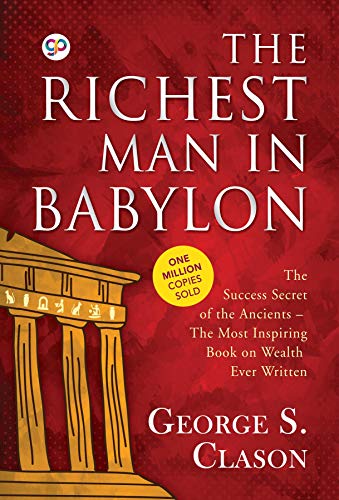The Richest man in Babylon is a classic read. Here’s the most important takeaways and how you can apply them to live your rich life.
Below is another book review installment from Rachel Stephens. Rachel is a 20-something financial analyst.
In the book billed as “the Bible of financial freedom,” George Clason shares a timeless set of principles in The Richest Man In Babylon. His goal, to provide insight to “those who are ambitious for financial success,” is achieved through simple storytelling.

Ready to ditch debt, save money, and build real wealth? Download my FREE Ultimate Guide to Personal Finance.
As a series of short stories, the book teaches straightforward lessons that aim to show that the secrets to wealth building are unchanging and remain applicable throughout history. The common theme of the tales is that a person can work hard, learn from their mistakes, and become wealthy. While none of the concepts are likely to be earth-shattering for most readers, they encapsulate the fundamentals that are the basis to money management.
Despite titular connotations, The Richest Man In Babylon is not religious. That said, the book’s format and diction will likely feel familiar to any who have attended Sunday school. Similarly to Sunday school, while there are many great truths to be learned, it can also be difficult to stay awake at times. Another effect of framing the book this way is that the advice given comes across as “Biblical” and infallible. While I do believe that the book is full of sound principles and a strong basic framework, I also feel some of the details are debatable.
Ready to ditch debt, save money, and build real wealth? Download my FREE Ultimate Guide to Personal Finance.
The primary lesson comes from Arkad, the proclaimed richest man in Babylon. At the bequest of the King, Arkad shares his “seven cures to a lean purse” so that both individuals and society as a whole can reap the benefits of fiscal growth.
- Start thy purse to fattening. This point is actually the crux of the book: the classic principle of paying yourself first. Clason recommends saving at least 10% of all income earned. Even in his example of those who are paying off debt, he still advocates setting aside this one-tenth. If you want to save money for your future, you must begin by consistently setting aside part of your earnings today.
- Control thy expenditures. Essentially, this is learning to live within your means and avoiding lifestyle inflation. Clason deems lifestyle inflation to be an ‘unusual truth’ of humanity and states, “what each of us calls our ‘necessary expenses’ will always grow to equal our incomes unless we protest to the contrary.”
- Make thy gold multiply. Your wealth should extend beyond your income. Put your money to work by making smart investments and taking advantage of time and compounding interest.
- Guard thy treasures from loss. Here, the book encourages the protection of principle from loss. It is easy to criticize this idea, as most of us feel that investment vehicles that have the potential to lose value, such as stocks, are essentials part of a balanced portfolio. If you take a bigger picture view, however, the lesson becomes more palatable. The penalty of risk is the potential of loss. Know your risk aversion and understand the risks in your portfolio.
- Make of thy dwelling a profitable investment. This is yet another debatable principle. Clason’s argument is that it makes more sense to make payments that will eventually become equity rather than giving money to a landlord. Rather than getting sucked into renting vs. owning debate, I will defer to a Scrooge Strategy tip and say “run the damn numbers” and see which method makes sense for you at this particular point in your life.
- Insure a future income. This boils down to retirement planning and insurance. Due to the fact that insurance didn’t exist in ancient Babylon, Clason really doesn’t dive into this point much at all.
- Increase thy ability to earn. Position yourself to make more money by improving your skills and making yourself more employable. Train yourself, go to classes, take jobs on the side; whatever you chose, set specific and measurable performance goals and start working to earn more money now.
The book’s other main lesson is the “five laws of gold” that Arkad teaches his son. The first three laws list ways to build wealth and are fairly repetitious with the above principles. Namely, the laws mandate paying yourself first, investing your money well, and making informed investment decisions.
Ready to ditch debt, save money, and build real wealth? Download my FREE <a data-iwtbox=”ug-finance”>Ultimate Guide to Personal Finance. </a>
The remaining two laws describe ways in which money and wealth will be lost. Specifically, it mentions avoiding investments with which we are unfamiliar, trying to seek ‘usurious’ returns, or trusting our ‘romantic desires in investment.’ Overly-complicated portfolios are likely to fail. Given all the Ponzi schemes that are surfacing these days, these lessons especially hit home right now. It is not the sexy investment strategies that win, for these are the investments that are often least understood and most risky.
The remainder of the book is peppered with lessons and insight. Choose wisdom over money. Borrow sensibly, as the unintelligent use of debt will undoubtedly become a later burden. Seek luck by working hard and accepting opportunity, not by waiting for one-off successes. And my personal favorite, “where the determination is, the way can be found.” Commit, follow through, and enjoy your successes.
The book can often feel simplistic and repetitive, but the advice about earning and savings are sound. By its nature, a book that is set in the days well before banks and organized markets is going to be sparse on details. This is not the book to read if you are looking for a how-to guide or specific techniques. Rather, this is a book that takes a theoretical approach to examining personal monetary policy.

At less than 100 pages, The Richest Man In Babylon is a quick read. This book would be an excellent choice for those who respond to qualitative motivation and storytelling. It would also be a particularly pertinent book for those that may feel overwhlemed by the all the recent market turmoil. If this book accomplishes anything, it demonstrates that the fundamental truths to wealth building are still applicable today.

